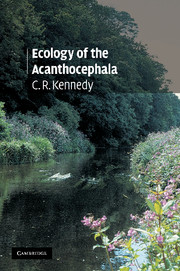Book contents
10 - Conclusions and overview
Published online by Cambridge University Press: 12 August 2009
Summary
It is suggested in Chapter 1 that although the phylum Acanthocephala is a small one with few species compared with the parasitic platyhelminths and nematodes and appears to show little diversity, nevertheless acanthocephalans are common, widespread and by any criteria they must be considered a successful group. It is also suggested that they exhibit a distinctive pattern of parasite–host co-evolution that differs from that found in other groups of parasites. As is the case with other groups of parasites, their anatomical simplicity is not evidence of degeneracy but rather of high levels of adaptation to their particular mode of life. Indeed, anatomical simplicity and similarity may bear little or no relationship to molecular diversity: morphological similarity and uniformity may in fact disguise molecular diversity. The evidence to date suggests strongly that much acanthocephalan diversity is to be found at the molecular level. Acanthocephalans may be understudied, but they should not be underestimated. They present a challenge to a number of paradigms: they show that anatomical and life cycle diversity is not important for the success of a group nor should the importance of a group be judged by the impact of its members on humans and/or their domestic animals. Acanthocephalans may have important and subtle ecological effects on ecosystems and food webs even though they do not exert pronounced pathological effects on their vertebrate hosts. More than any parasitic group, they are adapted to exploit whole ecosystems and not just their hosts in them.
- Type
- Chapter
- Information
- Ecology of the Acanthocephala , pp. 200 - 210Publisher: Cambridge University PressPrint publication year: 2006



